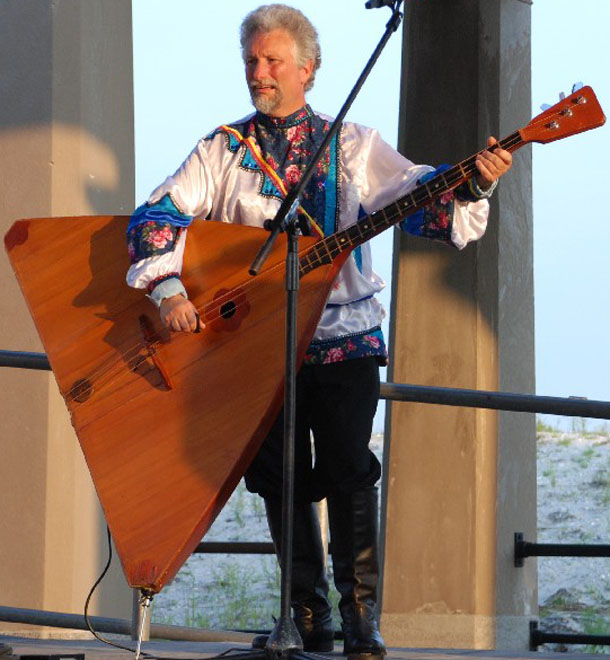Russian folk music
spans many ethnic groups and cultures. Each group has their own varieties and
music and dance. Folk music is still quite popular and is often tied with many
of their cultural celebrations. However, during the Soviet era, folk music was
seen as something different. It was either for the people (democratic) or for
the working class (proletariat). Art music was often seen as being
higher-class. Traditional folk music was even pushed as an alternative to other
Western music.
 |
| This is a contrabass balalaika. File this instrument under "Size doesn't matter." |
In the earliest
days, the Russian Orthodox Church banned musical instruments, saying they were
from the devil. (No, just the woodwinds. Just kidding, I love my
woodwind-playing friends.) Singing became the preferred means of music (they obviously
have never heard what I call Old Lady Soprano), used for both singing religious
songs and songs about village life. It’s no wonder that Russia has developed
some of the world’s finest choral ensembles. Some of the more common
instruments include the balalaika (a triangle-shaped, 3-stringed instrument),
domra (Russian version of the mandolin with either 3 or 4 strings), gudok
(pear-shaped bowed instrument), a couple of different kinds of accordions
(bayan, garmon), svirel (Russian flute), volynka (Russian version of the
bagpipes), zhaleika (Russian clarinet/hornpipe), and several different
percussion equivalents.
There are several
types of Russian folk dance. One of the more common types is the khorovod, a
circle dance where dancers hold hands and sing. Others include a bear dance
(where dancers dress as bears), the kazachok (of Russian and Ukrainian origin,
literally “Little Cossack”), the kamarinskaya (a quick tune accompanying a
squatting dance called the kazatsky), and the chechotka (a tap dance typically
in woven shoes made from bast [fibers from the bark of certain trees]). Russia is also well known for its ballet schools. And of course, it's acrobatic Cossack Dance.
As far as classical
music goes, Russian classical music goes back to court music and religious
music. It wasn’t until Mikhail Glinka focused on secular music and wrote some
of the first Russian operas. Along came a group of composers known by the
nickname “The Might Five”: Rimsky-Korsakov, Borodin, Mussorgsky, Cui, and
Balakirev. One of the most famous composers is Tchaikovsky, and perhaps his
successor Rachmaninoff. The 20th century brought along composers
such as Stravinsky, Prokofiev, Scriabin, and Shostakovich.
As far as modern
music goes, I found several that I liked. I had long been a fan of t.A.T.u. since they first came out on
the music scene. They gained a lot of attention because no one could really
figure out whether they were lesbians or not (gasp!). Their music is half pop,
half techno. And that’s what I liked about it.
Another group that
has made the news many times is Pussy
Riot. When I first started hearing about them, it was kind of awkward
because of their name, but now, thanks to “grab ‘em by the pussy,” it’s no
longer quite as awkward. They’re quite open about their opposition to the Putin
and Trump administrations. I really wish they’d make a full-length album. I
love their style. I'd totally buy it.
I came across quite
a few indie and alternative bands that I could get down with. I’m just gonna
list them here: Mumiy Troll (kind of
reminds me of the Brazilian band Skank in a way), Zemfira (a good example of creating catchy songs with the minimal
number of chords possible), Splean
(for the most part, tends to be a little slower), Bi-2 (sounds like they would be good friends with The Smiths.
Maybe.), Zveri (a little harder,
with a 1990s sound), and Korol i Shut
(definitely a harder sound on this one, almost punk at times but then they’ll
change up to a classical/folk sound).
I listened to Leningrad, who has almost a gypsy
punk/spa sound, eerily a lot like Gogol Bordello (who I’m a big fan of). There’s
one song that uses asterisks in it, indicating it’s a bad word, but it’s in
Russian, so I have no idea what it is. It’s a little anticlimactic. Another ska
band I came across is Distemper. Pretty
catchy stuff.
One metal band I
found is Mechanical Poet. They mixed
a lot of strings into their music as well, maintaining a goth sound to their
music. And like t.A.T.u. and Pussy Riot, they also sing in English. Arkona is another folk metal band I
came across as well.
There were even a
couple of hip-hop groups I listened to. Bad
Balance is one I listened to. The flow and rhythms were pretty good and the
underlying music was pretty catchy. The same is true for Vlady & Kasta. Kirpichi
is a little different because the music underneath is closer to rock beats,
although they will use other styles.
I even found a
Russian reggae band: Jah Division.
I’m a fan of global reggae, and it always amazes me that everyone adds a little
bit of their own flavor to it. In this case, there is a very prominent Russian
flair to it.
There are also
several DJs and electronic artists out there that span many different
sub-genres. A couple that I listened to was Serebro (more club dance style crossed with pop) and Otto Dix (like a cross between folk
metal and electronica. Rob Zombie meets The Nightmare Before Christmas).
Up next: the food
No comments:
Post a Comment